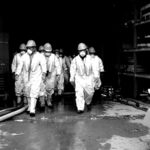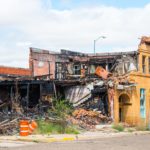Extreme weather conditions can bring anything from gusty to ravaging wind, heavy rain, hail and even tornados. With strong storms the likes of which we’ve seen recently, it pays to be prepared and to know who to call in the event of major damage. Whether you had high winds topple trees or rip loose heavy limbs, or tornados tear through your area, you can rely on our disaster restoration specialists to help you pick up the pieces and restore your home to its original condition. Service Master damage restoration professionals can contain water, and help reduce damage from water or fire if a fallen power line ignites a tree, your property or even your home.
 Our disaster recovery, restoration and cleaning specialists are available whenever disaster strikes — 24/7, 365 days a year. Knowing whom to call before disaster happens is one of the ways you can prepare yourself in the event of future disasters. Locate a ServiceMaster restoration professional in your area by visiting RestorationMasterFinder.com and keep the information in a safe, easily accessible place.
Our disaster recovery, restoration and cleaning specialists are available whenever disaster strikes — 24/7, 365 days a year. Knowing whom to call before disaster happens is one of the ways you can prepare yourself in the event of future disasters. Locate a ServiceMaster restoration professional in your area by visiting RestorationMasterFinder.com and keep the information in a safe, easily accessible place.
We are experienced in all forms of disaster recovery services:
Fire Damage Restoration
We can typically schedule emergency fire disaster restoration services within three hours of your initial call. We’ll work with you throughout the restoration to help you make the best decisions about repair, restoration or replacement of your property.
Water Damage Restoration
Our restoration specialists are trained to tackle burst pipes, leaky roofs or water damage resulting from extinguishing a fire. Recovery services for water damage include removal of excess water, professional drying, dehumidifying, mold prevention techniques, and repair or replacement of structural elements such as rotted wood or ruined drywall.
Flood Damage Cleanup
We are experts in recovery following floods, which require special equipment and training to handle the problems caused by sewage. Clean Master specialists will safely remove water and sewage and effectively clean the property to remove bacteria and ensure a safe and healthy home environment for you and your family.
Other steps to take before disaster strikes:
Establish and review an evacuation route
Make sure the entire family is aware of your evacuation plan, and periodically review it with them. Always keep plenty of gas in your vehicle in case you need to travel a considerable distance to secure shelter in the event that your home is damaged extensively by passing storms.
Keep contact information on hand for out-of-state friends or relatives
In the event your area succumbs to major flooding or is even put under a state of emergency by the municipal or federal officials be sure you have an out-of-state contact you can rely on for assistance while your home or the entire area is under large-scale recovery and restoration efforts.
Identify a meeting place
In case you and other family members are separated during a natural disaster, make sure you are all aware of a spot you plan to gather near your home. Also identify a plan B, for a spot outside of the your vicinity in case you cannot return, or the damage is so extensive your safety may be compromised. All family members should be aware of the address and phone number for both locations, if applicable.
Have a plan in place for your pets
Your pets are like family too. Consider them in your planning the same way you plan for the rest of the family. Most hotels will not allow pets so you will need to consider where you can house them in the event of a disaster. Make sure they wear identification at all times and keep a photograph of them in your important papers should you need to search for them after the disaster at animal shelters or other makeshift centers.
Protect your valuables
For the best possible restoration of your home and belongings, it’s best to photograph rooms in your home and certain possessions or make a video of them for insurance purposes. As for important documents and records that prove your identity, such as birth certificates, bank and credit card statements and medical records, store them in easily transportable waterproof containers. This one step will prevent having to rebuild your entire life from the ground up in the event of a disaster.
Stock up on important supplies
This list of goods covers what anyone should have in their home in the event of a sever storm or other disaster:
- Three days worth of non-perishable, ready-to-eat canned food items and a manual can opener
- Enough bottled water for one gallon of water per person per day for three days
- First aid kit that includes pre-moistened antibacterial wipes and insect repellant
- List of medications and prescriptions for each member of the household
- Flashlights and plenty of fresh batteries
- Disposable flash camera to take pictures of post-storm damage to home and/or vehicles
- Pen and paper
- Extra blankets and clothing
- Alternate cooking source
- Special items for infant, elderly or disabled family members, including one-week supply of medications and foods for infants or those with special diets
- Crescent or pipe wrench to turn off gas and water
- One quart of unscented bleach or iodine tablets (for disinfecting water if ordered to do so by health officials) and an eyedropper (for adding bleach to water)
- Personal hygiene items such as soap, toothpaste and toothbrushes
- Fire extinguisher that you are sure is in working order


